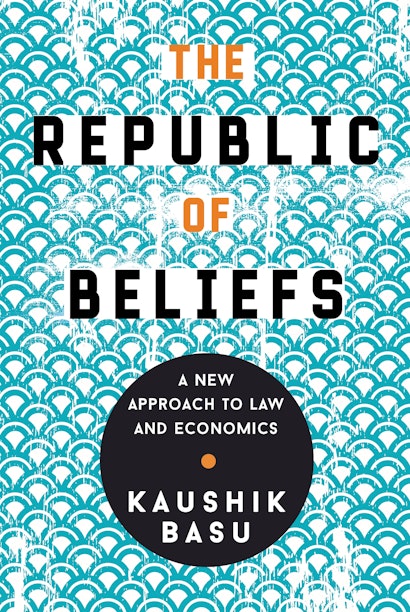In The Republic of Beliefs, Kaushik Basu, one of the world’s leading economists, argues that the traditional economic analysis of the law has significant flaws and has failed to answer certain critical questions satisfactorily. Why are good laws drafted but never implemented? When laws are unenforced, is it a failure of the law or the enforcers? And, most important, considering that laws are simply words on paper, why are they effective? Basu offers a provocative alternative for how the relationship between economics and real-world law enforcement can be understood.
Basu summarizes standard, neoclassical law and economics before looking at the weaknesses underlying the discipline. Bringing modern game theory to bear, he develops a “focal point” approach, modeling not just the self-interested actions of the citizens who must follow laws but also the functionaries of the state—the politicians, judges, and bureaucrats—enforcing them. He demonstrates the connections between social norms and the law and shows how well-conceived ideas can change and benefit human behavior. For example, bribe givers and takers will collude when they are treated equally under the law. And in food support programs, vouchers should be given directly to the poor to prevent shop owners from selling subsidized rations on the open market. Basu provides a new paradigm for the ways that law and economics interact—a framework applicable to both less-developed countries and the developed world.
Highlighting the limits and capacities of law and economics, The Republic of Beliefs proposes a fresh way of thinking that will enable more effective laws and a fairer society.
Awards and Recognition
- One of Diane Coyle's Best Economic Books of 2018
"One of the most interesting and exhilarating books I’ve read for ages. . . . This is a beautifully written book, very profound. . . . The Republic of Beliefs offers a distinctive and revealing perspective on public policy, and couldn’t be more timely."—Diane Coyle, Enlightenment Economics
"In this important book which is most lucidly written, Basu shows that a game-theory paradigm can lead us to ask critically important questions about what it is that might make people observe the law."—Robert Lee, Journal of Law and Society
"An unqualified success. . . . the argument in its totality is overwhelming, and it is only to be
hoped that practitioners of the discipline of law and economics will be willing to bring
its suggestions to fruition."—Mario Ferrero, Journal of Economics
"The book is a message of hope that institutions and laws governing citizens are not static. It has the potential to reinvigorate the space for multidisciplinary inquiries into law and economics, and promises to develop a framework for law and economics that departs from orthodoxy."—Sarthak Gaurav, Economic & Political Weekly
"The book resolves several conundrums faced by the existing L and E discipline. . . . the book provides a rich framework that can be used by the researchers and policymakers to address the outstanding issues."—Ram Singh, Indian Economic Review
"This is a fascinating and important book. Focused on what goes on in people’s minds, Basu offers an ambitious new account of why people obey the law. A major contribution for theorists and practitioners alike."—Cass Sunstein, author of #Republic
"The Republic of Beliefs tackles one of the great unanswered questions of law—why is it that some laws are effective at changing people’s behavior, while others languish, unenforced by the state and ignored by the public? This question is an urgent one, both in developing and advanced countries. With a spare, elegant style, Basu offers a deeply satisfying game-theoretic account while educating readers with little background in economics."—Eric Posner, coauthor of Radical Markets
"Each society is like a game and laws provide some of the rules of the game. In this delightful and penetrating book, Basu offers a new approach to law and economics that flows from a deep understanding of the society-as-game paradigm. After reading The Republic of Beliefs, your perspective on the role of the legal system in economic development will never be the same."—Herbert Gintis, author of Individuality and Entanglement
"‘Kaushik Basu’s blend’: An economist who always questions the most fundamental assumptions of economics. A person who has phenomenal knowledge of the real world and clear views about how to improve it. While reading this book, I felt as if Basu was talking directly to me, with his intonation, his penetrating gaze, and above all his unbounded intellectual excitement and love for human beings."—Ariel Rubinstein, Tel Aviv University and New York University
"Economics takes for granted the existence of a reliable legal framework for economic interaction, but has largely ignored how that legal framework is produced. This book is a long-overdue and critical contribution to the study of this foundational question. Emphasizing the core idea that a legal order is created by influencing people’s beliefs about what others will do, Basu provides a much-needed basis for a reinvigorated law and economics."—Gillian Hadfield, University of Southern California
"In this thought-provoking book, Basu urges us to think in new and better ways about pressing problems at the intersection of economics and the law. His masterful command of the economist's toolbox and broad understanding of the legal-economic nexus combine to generate a road map for exploring important questions left unaddressed by the traditional law and economics paradigm."—Steven G. Medema, author of The Hesitant Hand
"In seeking to answer the big question of jurisprudence—what is law—Basu presents an argument that is elegant, interesting, and useful."—Oren Sussman, University of Oxford


